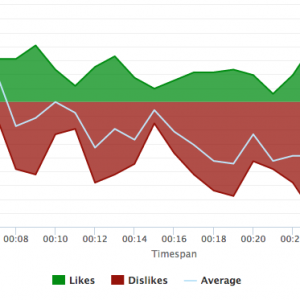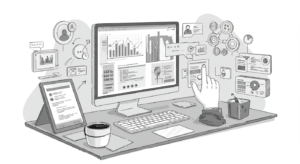Innovator Interview: Chris Gomez, Toyo Tires
As part of our Innovator Interview Series, every month Spot Trender interviews Marketing/Advertising innovators on the future of data-driven marketing to learn the latest theories, principles, and mindsets that work. We also ask these experts for tips and stories on how to implement these ideas successfully. This month we featured our interview with Christopher Gomez, Product Marketing Manager at Toyo Tires.
Q: Where is Market Research going?
Moving forward, for many industries, product quality is no longer a clear differentiator, e.g., the differences between products are becoming increasingly minute—almost ceasing to exist in some cases. Consequently, market research and the insights derived from this intelligence are extremely important because they can help an organization with the incremental advantages they need to distinguish themselves from their competition or to better understand their customers.
Market research and data-driven decision making should be an integral part of any industry or company’s planning process. As marketers today we have so much data at our fingertips ready to be analyzed. This data paints a picture of how people view your brand, how your products are used, and how people’s expectations will shift in the future. It is vital to make data-driven decisions.
There are many ways you can integrate data into your decision-making process. For example, on the product planning side – you can use your data to identify the wants, needs, and expectations of the customers using your products. On the marketing side, data can be leveraged to identify the aspirations, product perceptions, and feelings associated with your brand.
“It is vital to make data-driven decisions.”
Q: As data-driven marketers, what should we do to adapt to constant change?
First, we must continuously innovate and look for methods to gain incremental insights – especially on metrics that your competitors may not have. It’s very similar to high-performing athletes. They are always looking for new techniques, methods, and mindsets to gain an advantage over the competition – like how to eat to better fuel their body, how to sleep to better enable high performance, how to adapt their thinking to an achievement-oriented mindset, and how to train more effectively to outperform their competition.
Second, look outside your industry to derive inspiration. For instance, major automotive OEMs are looking to Consumer Packaged Goods (CPG) companies on how to refine their packaging for better branding and marketing. We are actively researching how consumer’s experiences in the increasing digitally driven world are impacting their expectations in our industry. Which leads to the next point.
Third, take an interdisciplinary approach to market research and marketing in general. For instance, the digital retail space (like Amazon) transformed customer’s expectations on product availability, the shopping experience, and delivery timing. We must begin to realize that consumers don’t just exist in your industry in some sort of vacuum. We are competing with other industries for their attention and purchase power, meaning you’ll need more and better data on consumer behaviors to optimize your marketing efforts and effectiveness.
Q: In practice, what could we do to implement the principles above?
First, take proactive steps to make sure your research partners are thought-partners, not just vendors, who challenge you to think and try different approaches. Research partners should push you to ask the hard and uncomfortable questions – questions that cause organizations to think harder, better, and to produce better results.
Second, never stop raising the bar. I’m a firm believer that it’s better to approach things as if you have a target on your back because it forces you keep improving yourself, and change for the better. In this case, versus being a challenger brand, you are more forward-looking. So rather than always looking at what your competitors are doing, you are focusing on fundamentally reshaping your brand, your products, and your industry.
Third, develop a well-rounded expertise. Data alone isn’t enough; business success requires people who can execute based on the data. The ability to capture more data is a double-edged sword, in one instance it gives you the ability to generate powerful insights, but it can also serve as the precursor to data overload. You should develop a team who can not only analyze, understand, and interpret the data but also deliver actionable recommendations.
“Research partners should push you to ask the hard and uncomfortable questions – questions that cause organizations to think harder, better, and to produce better results.”
Q: What advice would you have for someone who is relatively new to data-driven marketing and market research in general?
Market research is as much an art as it is a science, so analytical skills and storytelling skills go hand in hand. For someone to be successful in market research, they’ll need a firm grasp on both elements. You’ll need to develop strong analytical skills to be able to understand and interpret the data effectively.
However, you should not rely on analytical skills alone. A great analyst should the ability to tell engaging, memorable stories using the data – with characters, plot, conflict, climax, and a resolution that all relate back to the key findings of the research to better position the company for success.
The key takeaway is to continuously improve on both the art and science of data-driven marketing.
About Chris Gomez: Chris Gomez is currently a Product Marketing Manager for Toyo tires, and has an extensive background in the field of market research in quantitative and qualitative approaches as well as product and brand strategy. He has worked for Toyota marketing managing the Toyota Tacoma, Tundra, Sequoia, and Land Cruiser model lines. Prior to his time at Toyota he worked for the market research agencies of LRW (Lieberman Research Worldwide) and global market research firm GfK where he has been able to work with prominent brands like Disney, ABC, ESPN, DirecTV, Sony, Bravo, J&J, P&G, Lexus, Hyundai, Infiniti, GM, and Honda. Over the course of his career, he has also been able to work with key agency partners like Saatchi & Saatchi, Conill, Burrell, interTrend, GSD&M, The Richards Group, Weiden+Kennedy, and J. Walter Thompson. As a former Division 1 athlete and professional soccer player for FC Dallas of Major League Soccer a team-driven, high-performance culture is what motivates him to continuously innovate and excel.








